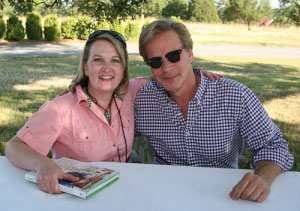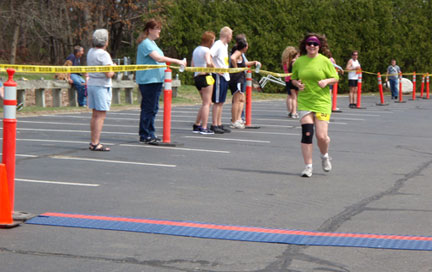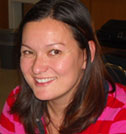|
|
         |
|
|
 |
|
 
|
 |
| |
|
|
| |
|


Freelancers: Shed Your Pajamas and Share Your Passions
By Charlene Oldham
her first months as a full-time freelancer, Lisa J. Jackson found herself spending more time chasing dust bunnies than stories. Cleaning out the refrigerator was another favorite procrastination-related pursuit in those early days.
“It doesn’t feel like a real job,” she says of working from home. “You can get up when you want and do what you want.”
When she left a job as a technical writer and training development specialist to begin freelancing full time seven years ago, Lisa found that rarely meant cranking out thousands of words a day behind a desk in her home office. Today, she avoids procrastination and those pesky dust bunnies by working in nearby coffee shops and cafes.
“I just find that being out and about is much more productive,” says Lisa, who works more efficiently surrounded by people and conversations.

“I saw the world more, and that came across in my writing.”
(Photo by Kelly Stamps: Christie Ison with TV host and gardening expert P. Allen Smith.)
Get Out and Learn Something New
Freelancers of all stripes say they are better—and more productive—writers when they find reasons to shed their pajamas and share their passions through attending workshops and conferences, teaching classes, volunteering, diversifying their work, conducting in-person interviews, or even taking classes that have little to do with drafts and deadlines.
After spending time at home with two young children and freelancing full time for years, Christie Ison found herself craving a new challenge and more adult interaction. She’d learned from years of whipping up family meals that she was interested in and good at cooking. After deciding to attend culinary school, she drafted a unique proposal for the administrators at Pulaski Technical College Arkansas Culinary School in Little Rock.
“I learned from my PR days that it never hurts to ask,” she says. “Sometimes people are willing to do trades.”
In exchange for free classes, she agreed to write about her time in culinary school and allow the institution to use her content at Fancy Pants Foodie, which now boasts more than forty thousand readers, for anything they wanted. The experience revived Christie’s writing and her outlook on life.
“I had gotten kind of stodgy,” says Christie, who had been cranking out a lot of the same types of assignments in between colic and carpools.
Learning about a new field, working side-by-side with culinary students of all ages, and pursuing a more physically demanding profession also polished her prose.
“It made me feel so much younger,” she says. “I saw the world more, and that came across in my writing.”
Her associate’s degree and designation as a “certified culinarian” also make her uniquely qualified to write about food from a first-person point of view not open to other freelancers.
“I think, if nothing else, it adds credibility,” says Christie, who next hopes to intern in several professional kitchens and blog about her experiences. “Now, I have this very narrow niche.”
Setting yourself apart as a knowledgeable niche writer provides added incentive to take classes and earn credentials in new fields. Book author and freelancer Kelly James-Enger already had a long list of health and wellness stories to her credit before becoming a certified personal trainer. The mother of two is always looking for ways to diversify her work and beat the burnout that sometimes comes with spending hours in front of a computer screen.
“I write a lot about fitness; so to me, it made sense for me to get the certification as well,” says Kelly, whose most recent book is Writer for Hire: 101 Secrets to Freelance Success. “I also have trained some friends and family members and could see doing it part time at some point in the future.”
Earning the certification from the American Council on Exercise helped bolster Kelly’s already-extensive author platform, making her pitches more appealing to trade publications, increasing her credibility as a motivational speaker on health and wellness topics, and giving her an advantage with industry professionals looking for a collaborator who has a way with words.
“I also really enjoy consulting with authors in the health/wellness fields who have books or other projects they need help with, and it’s added another dimension—and income stream—to my work, which is great,” says Kelly, who once took a part-time job at Trader Joe’s grocery store in an effort to keep things fresh as a freelancer.

“As humans, we’re made to move, not sit motionless for long periods of time! The more I move, the better I feel both physically and mentally.”
(Photo: Kelly James-Enger)
Get Out and Exercise
Kelly’s consulting work is a natural extension of her personal mission to stay fit and share what she’s learned with others. As someone who’s lost forty-five pounds and kept it off for more than a quarter century, she suggests that freelancers commit to a regular exercise program and schedule it as part of their workday.
“As humans, we’re made to move, not sit motionless for long periods of time! The more I move, the better I feel both physically and mentally,” says Kelly, who blogs about freelancing topics at Dollars and Deadlines.
And while taking a quick walk around the block is better than nothing, it’s sometimes important to push your body and turn off your brain.
“I’m always thinking about the assignments on my desk, encroaching deadlines, the amount of money I’m making, my plans for the next year, when I’m going to find enough time to write another novel, you name it,” she writes in Writer for Hire. “One of the rare times that I am able to turn off the incessant mental chatter is when I’m standing on the pedals of a spin bike, pushing through another two-minute sprint interval or trying to balance in triangle pose during yoga.”
Lisa J. Jackson agrees that building your muscles helps challenge your mind. The New Hampshire writer bikes, runs, and recently began competing in short distance, sprint triathlons in which she always aims to beat her previous time. Although she accomplished that in her last race, it was a close call. Since, she’s committed to setting more specific goals for improvement. Training for triathlons has inspired her to boost her business efforts as well.
“You can’t just show up and do something,” she says. “You have to work at it.”

(Photo: Lisa Jackson finishing her first 5K!)
Get Out and Volunteer
And sometimes that work has nothing to do with getting paid. Lisa has been a Big Sister to the same girl for eight years through Big Brothers Big Sisters and finds it a great way to stay in touch with youth culture. Christie, the certified culinarian, currently volunteers as an instructor for Cooking Matters. Part of Share Our Strength’s national No Kid Hungry campaign, the courses in Cooking Matters teach low-income families nutritional, shopping, and cooking skills. Kids and adults learn knife skills, prepare food, and share a healthy meal at the end of each session.
“It’s exciting to see people discover they actually like brown rice,” says Christie, who follows a gluten-free diet herself.
Get Out and Attend Conferences and Workshops
Discovering new skills and tapping into other’s enthusiasm is also why freelancers love to attend writing conferences and workshops as both speakers and students.
“I personally become energized by meeting and teaching/encouraging other writers, especially those who are new to the craft,” says Kelly.
Get Out and Teach
After spending five years as a daily newspaper reporter and another five teaching high school and middle school language arts in the Saint Louis area, I wanted to get back into writing, but loathed leaving behind the classroom—and at least one guaranteed paycheck—behind. Teaching undergraduate communications courses at Linwood University as an adjunct professor has proven to be the perfect part time compromise. I’ve shared my knowledge with students and learned as much in return. A few semesters in the classroom has forced me to embrace social media as a teaching tool and introduced new technology and trends that I’ve already been able to parlay into published pieces. Teaching classes a few times a week also forces me to don dress clothes with real waistbands and gives me free access to an excellent college fitness center, where I have an excuse to pull on comfortable clothes again and end every class day building my body while recharging my brain.
Kelly also attends a conference or two every year in order to network, learn new skills, and keep up with the latest industry trends. “It’s good for me—after fifteen-plus years of full-time freelancing—to be around that energy and enthusiasm!”
Lisa attended weekly local workshops, where authors wrote and talked extemporaneously about the same topic. She often writes features and business profiles for area newspapers, and now she can view her community through a variety of different eyes and writing styles thanks to the workshops.
“I think any writer who can get out and talk to other writers is going to improve their craft,” says Lisa, a frequent contributor to the New Hampshire Writers’ Network blog. “Not that you compare yourself to other people, but somehow, it just raises the bar.”
Get Out and Write About the Unknown
Lisa recently found herself surrounded by raised bars of another kind when an editor assigned her a story about a high school equestrian team, in which students competed and took classes in areas including dressage, western riding, and yes, bar jumping. She says she sometimes enjoys taking assignments from editors rather than pitching her own ideas because they push her out of her comfort zone and into the community.
“I get all these great ideas to report on what I never would have thought of on my own,” she says. “Actually having to get out and report on an event is uncomfortable for me, which is good. “I’m always pushing myself to be a little uncomfortable.”
So, whether it’s taking cooking classes, training for triathlons, teaching writing workshops, or simply taking on a new topic, freelancers agree getting out of their comfort zones and into the real world improves their writing, their productivity, and their lives.
***

Charlene Oldham is a freelancer and adjunct professor of communications in Saint Louis. She blogs about writing and life at www.CharleneOldham.com.
-----
Enjoyed this article? Check out these related articles on WOW!:
Interview with Jillian Michaels: Fitting Exercise and Nutrition in Your Writing Plan
What's Your Forte? Interview with Kelly James-Enger and Nancy Hendrickson
Writers' Conferences: 5 Reasons You Should Go Now and How to Get the Most for Your Money
Teaching Online = Writing Time
---------------------------------------------------------------

The Renaissance Writer
By Devon Ellington

onforming doesn’t land you the big deal or happiness. Stick to conventional wisdom, and you wind up with a conventional life. If it makes you happy, great. But if you’re the type of person who likes to color outside the lines and make your own breaks, the constant yammering about “find your niche”—whether it’s freelancing or novel writing—is going to hold you back instead of free you to be the best writer you can be.
When I made the transition from working full time on Broadway and juggling a writing career to writing full time, I was told I had to find and stay in my “niche.”
“What’s your niche?” these self-styled gurus would say. “Oh, you can’t possibly succeed as a freelancer/novelist/anything else without a niche.”
“I don’t need a niche,” I replied. “I’m a Renaissance writer.”
My reply met derision.
Most of these “experts” weren’t familiar with the Renaissance or the expression “Renaissance man,” which means a person with a well-rounded education, whose interests and abilities cover a wide range of topics. They thought I was writing dry tracts in dusty libraries about Botticelli, Da Vinci, Christopher Marlowe, and Isaac Newton. I spent plenty of time in libraries, and I even wrote about some of the above-named figures. I also wrote about many other people on topics ranging from thoroughbred racing to meditation techniques to lighthouses and the women who made history in them. I got paid to do it.
Then, the economy tanked.
Most of these writing “experts” vanished. Maybe they’re working in content mills for $1 an article instead of $1 a word. Maybe they’re working at McDonald’s. But I don’t see any of their bylines, in or out of their niche. Meanwhile, I made a living. I survived. It wasn’t easy; I wasn’t rich, but I survived by writing what interested me. That’s how I land my jobs. What do I want to learn about next? Oh, goody, do enough research to land the gig and then immerse myself in it!
There’s nothing wrong with specializing, with loving a particular topic and focusing on that one thing. If you love it, go for it. But you don’t have to climb into a little, bitty box and be that one thing for your entire career. You grow and change as a person and a writer. Why shouldn’t your range of topics?
What Do You Love?
This is the most important question, and one that may change over the years. What do you love? What is most important to you? Why aren’t you writing about it? Sometimes, we back away from writing about our friends or family. You don’t have to write memoir or essays; take what matters to you and transform it into fiction. Change descriptions, names, details. Start with a real person as your inspiration and let the character grow into a unique individual. The fully developed character evolves far from your original inspiration. You’ll be surprised by how many people you never met see themselves in your characters and are sure you’re portraying “them.” You’re not, so don’t stress about it.
“Although we’re often told to ‘write what you know,’ the truth is that we need to write what interests us.”
What Do You Know?
A lot of us feel like we don’t know anything. That’s not true. We know far more than we realize. A childhood friend wanted to go back to work after her kids were in school, but felt she didn’t “know anything.” She knew ever so many things: She knew how to help a child with homework. She knew how to run a household. She knew how to manage a budget. She knew how to organize and coordinate schedules. She knew how to write a good letter. She knew how to cook. She’s bright, funny, empathetic, and compassionate. All of these skills, individually or grouped together, are invaluable to nonprofits and child-centric organizations. She started as a volunteer tutor at her kids’ former school, decided to take some education classes, and now is a special education teacher.
I have a list of what I call “Areas of Specialized Knowledge.” There are some topics in which my knowledge is pretty deep, and I’ve got a lot of personal experience: theatre, tarot, writing, horse racing, cooking, development for nonprofits, yoga, meditation, literature. There are topics I know moderately, but could brush up and go deeper: lighthouses, the American Revolution, medicinal herbs, gardening, environmental science, chemistry. There are topics I know just enough to get away with, but again, I have a learning curve: sailing, archery, astronomy.
I could confidently pitch myself to write about anything in the first two categories. I might hold back on the third category until I studied more. I once landed a job covering a yacht race when I couldn’t swim and knew nothing about sailing. I had two weeks to get my hands on sailing vessels and learn—so I did. My angle was to come at the races from someone new to the sport. I knew enough to talk about the topics I covered with confidence, but I also had distance to point out things that are a given in the sport that struck me as odd. The articles gained a hugely positive response.
Make a list of what you know—confidently or vaguely—and make sure you’re honest with yourself about which is which.
What Interests You?
Although we’re often told to “write what you know,” the truth is that we need to write what interests us. We are intelligent, capable writers. We can learn. The trick is to learn quickly—if you’ve got a deadline, it’s up to you to learn what you need in order to write intelligently about your topic within the time frame your editor or client sets. Your lack of knowledge is not their problem, it’s yours.
If you know you have a longer learning curve, but you’re interested in a particular topic, immerse yourself in it before you start pitching for projects. Take classes: Coursera.org has online courses given by Ivy League professors—for free! However, if you sign up for a class, whether it’s free or expensive, take it seriously. It’s a commitment. Respect your teachers by keeping up with the work and turning in assignments on time. There’s no such thing as “too busy.” If it matters to you, you make it happen, whether it’s writing or anything else. There never is time—you make the time.
Sit down and write a list of what interests you. Not just a mild, passing fancy, but a deep desire to learn more. What steps can you take to become an expert? Now, take them!
“In order to survive and thrive as a writer, you’ll always have to juggle more than one project.”
Where Do Your Passion, Knowledge, and Interest Intersect?
This list helps you decide what to pitch now and where you need to deepen your knowledge and experience before pitching.
Start with what you know; then move in to what interests you. Look at your lists. Start creating pitches and outlines for topics in which you have both knowledge and passion. Set the groundwork for topics for which you have passion and lack knowledge. In order to survive and thrive as a writer, you’ll always have to juggle more than one project. Pitch, create, learn, fulfill, repeat.
Nonprofits as a Win-Win
Content mills and “content sites,” which pay pennies per article or where you are paid-per-click, keep you in a writing ghetto. Most legitimate, high-paying clients will toss you if they see a content mill on your resume. A top-level corporate human resources client (who refused to be named for this article) said, “If I see a content mill on a resume, I know this person is not serious about a writing career. By working for a content mill, a so-called ‘writer’ warns me to expect a lack of research skills, a lack of foundation in craft, low-quality writing, and an inability to meet deadlines with quality work. I don’t need to read the samples. The choice of venue tells me what I need to know. No sale.”
It’s a waste of your time and talent. You don’t learn, you don’t grow, and you’re certainly not paid what you’re worth from a content mill.
But how do you get samples to expand your areas of expertise, so you can pitch to higher paying markets in the field?
Nonprofits.
A credit from a nonprofit has clout. Find one whose mission you believe in, and set up a pro bono agreement. They get top-notch writing; you get top-notch samples that mean something in pitches.
I pitched for a job outside my comfort zone a few weeks ago. The editor asked me why she should hire me instead of someone with a master’s in the field. “I’m a professional,” I replied. “I know how to research. I know how to take information and transform it into something that enchants and entices.”
I got the job. You can, too.
***
Devon Ellington is a full-time writer, who publishes under a half dozen names in both fiction and nonfiction, and teaches writing all over the world. Her Jain Lazarus Adventures are handled by Solstice Publishing; and her romantic suspense novel, Assumption of Right (as Annabel Aidan), is out with Champagne Books. “Sea Diamond,” featuring Fiona Steele, is included in the Death Sparkles anthology, releasing in fall 2012. She’s published hundreds of stories, articles, speeches, and scripts throughout her career. Visit her blog on the writing life, Ink in My Coffee, and her website.
-----
Enjoyed this article? Check out these related articles on WOW!:
No Clips? No Problem. Build Your Portfolio with Stepping Stones
Choose Your Own Adventure: The Many Paths of Freelance Writing
Get in Great Writing Shape for Free: Free Classes, Conferences, and Contests
Making the Leap: The Transition into Full-Time Writing
---------------------------------------------------------------

Put the FREE Back in Freelance: Becoming a More Sustainable Writer
By Suchi Rudra

a freelance writer, you have incredible independence from the daily grind. But what about financial independence? A freelance career (although endlessly exciting!) is not the most stable and secure choice in terms of income; and to keep your bank account healthy, there are a few key ideas to keep in mind as you continue to grow your business. The bottom line is that if you live simply and do business simply, you can actually work, earn less, and still live a comfortable, free, and healthy life.
So how do you achieve this? By treading lightly and being content with what you have.
Treading lightly means leading a low-impact kind of lifestyle. This calls for low consumption, which also means keeping a low budget. It benefits you financially to tread lightly as you grow your freelance business.
Doing with what you have forces you to be creative—which you, as a freelancer and entrepreneurial spirit, already are. Everyone in the world is trying to “go green” these days, but essentially being sustainable is not about being part of a new trend—going green is about going back to basics. For example, cutting edge architects in the U.S. have been constructing “straw and bale” homes and winning tons of awards for highly-sustainable residential design. Guess what? This building material is centuries old. Living and working efficiently and sustainably is about consuming less, creating less, and doing with what you have—and that's just common sense.
Think Big: Long-term Lifestyle Strategies
Do a Lifestyle Expense Inventory
It’s pretty important to see on paper (not on screen!) the various categories of your life that suck up all of your hard-earned freelance income. But that’s life—you work to make money, so you can spend it—either by choice or by force. The key is that if you spend less, then you can work less, too.
To start, divide a sheet of paper into two columns entitled FORCE and CHOICE. Now, try to fill in these columns according to your lifestyle expenses. Things like rent/mortgage, groceries, and gas would go under the FORCE column—but be sure to write down the details for each expense. For example, you are paying XXX dollars a month for an X bedroom apartment in the XX part of the city. You will start to see, if you are being honest with yourself, that maybe some of these things don’t belong in the FORCE column after all. You might live alone with your golden retriever in a two-bedroom apartment and think: So what? Well, how about the fact that you don’t need two bedrooms for one person? Especially if you are renting and don’t plan to live there forever; it might make better sense to downsize to a one-bedroom apartment.
Under the CHOICE column then, you would put things like going out to eat X times a week, X coffees at favorite cafe, X bottles of wine, X tickets for movies/concerts/museums, X magazine subscriptions, X pairs of cute shoes, and so on.
Live Rent-Free with House Sitting
Yes, it’s a big change; but if you are at a transitional point in your life where you are looking for something that will shake things up, you should seriously consider being a house sitter. You can literally live almost anywhere in the world for free—it’s just the travel you’d have to pay for. But you don’t need to go far from your current location—house sitting is certainly possible all over North America. You can house sit for a month to try it out or even arrange to house sit for a year. Check out www.sabbaticalhomes.com and www.mindmyhouse.com for a huge range of possibilities.
You work as much as you spend—keep this in mind when you’re writing that excruciatingly dry and boring 5,000-word report for a client. Is it possible to cut down on the number of coffees by making coffee at home, by investing in an espresso maker? Is it possible to cut down on the number of shoes you “need” to buy?
The reason to do this self-inventory is to rethink what you have—because what we have (people and things included), we tend to take for granted. It’s a human nature thing. We easily accept that if we have had it for so long, if we have lived this way with these particular things surrounding us, then that is the way we will go on living. No harm, no foul—right? Wrong. You might call it a comfort zone; someone else might call it a rut. Either way, this is what’s keeping us stuck, so that we miss the chance to realize what other opportunities are out there to live a healthier, happier, freer lifestyle.
Take a Look Around You
A Low-impact Kind of Life
- Live lightly. If you’ve ever traveled long term or gone camping, think about what you had with you when you were on the road and out in the wilderness—think about how you had to carefully condense your life into one backpack or one suitcase (okay, maybe two), and figure out how you can strive to live at a more minimal level even when you’re at home.
- Be content with what you already have. Do you keep thinking: Oh, if only I had that super-duper computer/printer/scanner/cooking/cleaning machine, then I could do better business? Remember, your most important asset is actually your brain. You really don’t have to buy a book or take a class or pay for software to tell you how to be smarter and more productive as a freelance writer. Get up from the computer, go out and take a walk, and try to rely on yourself—your greatest natural resource.
- The above idea also applies to what you have in your kitchen. Don’t let food go to waste—make a leftovers party! I read about a woman who does a weekly leftover soup party, where all guests rummage through their fridges and bring over the wilting veggies and other soon to be discarded items, which are all thrown together and guaranteed to create a brand new and intriguing meal every time! If this sounds a bit too extreme for you, try freezing aging food: for example, a black banana stuck in the freezer for a few hours blends into a beautiful banana smoothie. And nothing beats a quickly defrosted meal for the deadline-pressured freelancer!
“Be content with what you already have.”
Keep The Change
Spend Wisely, Spend Less
- Shop at garage sales, moving out sales, pawn shops, second-hand stores. Someone else’s trash can definitely be your treasure, and you never know when you’ll come across the perfect writing desk or set of coffee cups for half the price and ten times the charm of what you’d get at your local chain/department store. Depending on where you live, you could grab some used (but still useful!) furniture off the sidewalk before the trash collector comes to haul it away. Browse the classifieds in your local and regional newspapers; check out Craigslist. Some people even love to give stuff away for free—as long as you can come and pick it up yourself.
- Apply for grocery store discount cards. Cut out coupons from your local papers.
- One way to make sure you keep from spending more than you want is to carry only cash. In Europe, this is quite normal—some cafes and shops don’t even accept debit or credit cards—and um, checks simply don’t exist. Withdraw only the amount of cash you know you will need, and take your credit card along just for emergencies. Being in debt is financially and mentally draining, so only buy things that you know you can afford now, and break that credit card habit.
“Efficiency is key to sustainability.”
Streamline Your Work
Declutter and Trim Down
- Unsubscribe from all those newsletters that you really don’t look at anymore or maybe never even signed up for. Clean out your bookmarks! Organize and clean out your files and desktop icons. Looking at old or unfinished documents might even inspire some new ideas.
- Be efficient. Efficiency is key to sustainability. Turn off the Internet when you’re writing—do the research later; check your e-mail later. The more you get distracted and jump back and forth between your work and your surfing, the more time you have to spend sitting in front of that screen—and that just isn’t what living a FREE-lance life is all about! If you can’t help checking your e-mail on weekends, at least don’t reply to it. Save it for a work day.
- If you get paid by Paypal, you will lose a small percentage of your payment every time, unless the publication pays the service fee themselves. If this is the case, ask the publication if they can pay you by check instead or if they are willing to accept the service fee. If you are paid by wire transfer (this often happens if your client is abroad), your bank will usually deduct a fee for this service as well. Again, try to ask for a check instead if possible.
- Earn more, work less. Work for overseas publications! If you live on the dollar and get paid in pounds or in euro, then you’re in a good position to reduce your workload. Research magazine and newspapers in the United Kingdom and Europe, and you might find that by offering stories about the United States or from an American angle, you are actually offering an international perspective that they wouldn’t have otherwise. In-flight magazines are excellent—look for transatlantic airlines based in Europe that fly to North America, like Lufthansa or Aer Lingus. This same idea applies to anywhere you might live: if you live in Mexico and write for magazines in the United States, you’re still earning more while spending less.
Healthy Body, Healthy Mind
Some studies have found that sitting down (usually in front of a computer screen) for more than two hours at a time will shorten your life. Though this might sound like one of those exaggerated statistics, it certainly does make you think about how long you keep yourself planted at your desk as you keep doing your freelance thing. Supposedly, we are the lucky ones: we don’t have to go in every day to the office to work an eight hour day. But as it turns out, there are a good number of freelancers who actually end up working more hours per week than they would if they had kept their office job.
If the whole point of being a freelancer is to be your own boss and to be free from a strict schedule and routine (or do you have another reason?), then you should take advantage of it! That means, you can certainly afford to get some exercise into your day—no excuses.
- At least once or twice during the day, get up, stretch, and go for a short walk, swim, or head to the gym if that’s your thing. If exercise doesn’t interest you, find something active that does and use your outing to run errands or get groceries—bonus points for not using your car! Shaking up your body will get your mind rejuvenated and re-inspired.
- Sign up for weekly classes of yoga or jazzercise or Bollywood dancing—whatever; not only will it get you out of your chair, out of the house, and feeling fit, but you never know when you’ll gain a new friend, a new client, or a new article idea.
- Just once, write an article by hand. Get away from your screen and keyboard, and sit down on a cleared desk or table with pen and sheets of paper. Feel like you're back in school? Good! Because back in the day, students still had to turn in ten page papers without a computer to type them on—and yes, they survived. Even if you know that you could never manage to do all of your work on pen and paper, it doesn’t hurt to try freshening things up and seeing what this different way of writing does to your mind—how it shifts the quality and process of your writing.
- Write a list of all the things that you’d rather be doing than working: the things that you loved to do as a kid, the things that make you smile, that feel rewarding, and that make you feel alive. Think about how you can weave these elements into the flexibility schedule of your FREE-lance life—and do it. Want to travel more? How about making a day trip this week or weekend after your deadlines are over? Want to work on your pottery? Do it tonight after you shut down your computer. Even for an hour. See how it makes you feel.
Some of these ideas might seem daunting, implausible, or uncomfortable at first. But once you make the decision to try and shed some of the more cumbersome layers of your freelance life, you will find that the rewards you reap will drive you to keep treading lightly in the direction that is best for you.
***

Suchi Rudra is a nomadic freelance writer who specializes in travel, sustainable architecture, education, and business. In her free time, she can be found lingering in sunny green spaces, writing songs or short stories, and plotting her next travel adventure. Read more at www.suchirudra.com.
-----
Enjoyed this article? Check out these related articles on WOW!:
Dreams of Long-Term Travel—Closer Than You Think
Get Organized! Expert Tips for Tackling the Messy Files and Piles that Make Writers Stress Out (Plus Cleaning Your Career Clutter)
Writing Through Distractions: Mothering, Time, Social Networking, Writer's Block
|
|
|
|
|